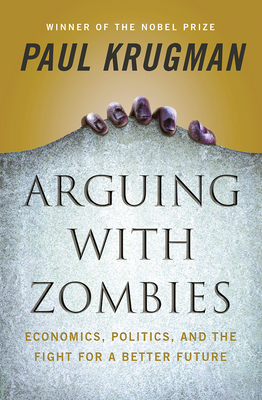Title: Arguing with Zombies
Rating: 5 Stars
Let’s get this out of the way first. For the most part, this is kind of a lazy book. Paul Krugman is a Nobel Prize winning economist that writes a column in the New York Times. The vast bulk of the essays in this collection have previously appeared in the New York Times in one form or another. So, if you’re a New York Times subscriber or have already consumed Krugman’s columns in some other form, this will be largely redundant to you.
The newspapers that I subscribe to only periodically run Krugman’s columns. I always find his point of view to be interesting, and most importantly when it comes to opinion pieces, to be actually based upon facts. Even though I knew that this would be a rehash of previously written columns, I thought that this would be a good opportunity to catch up on a writer that I enjoy reading.
As I said, Krugman is a Nobel Prizing winning economist. One of the major themes of this collection is how a theory based research economist ended up writing a primarily political column. I found that journey itself to be interesting.
Having said that, the most interesting theme is the struggle that he has had, over the past twenty years, debating both economic and political theories when the opposing point of view barely even maintains a fig leaf of truth or reality.
I consider myself a pretty fact based person. One of my frustrations over the last several years is how one side of the political spectrum (<cough>Republican<cough>) no longer even maintains a pretense of being evidence based. News that is unflattering to a conservative politician must be fake news. Elections that a Republican loses must be rigged or stolen. In my former home state of Washington, the Republican nominee for Governor, a woefully unqualified small town police chief (of a one man police force!) lost to the sitting two term governor (and past Presidential candidate) by well over ten percentage points and actually claimed that the election was stolen. It was ludicrous. I can’t even begin to get my brain wrapped around having it my job to resolutely and endlessly have to bat down willfully and woefully ignorant political positions.
That’s the Sisyphean task that Krugman has set up for himself in his columns. I have to say that he carries it off with aplomb. The term that he calls the economists and politicians that continue to regurgitate disproven or obsolete theories in the face of all evidence is zombies.
Make no mistake what he’s facing. It’s a zombie apocalypse. He is Ash facing off an Army of Darkness.
First of all, there’s the economists. After The Great Depression, John Maynard Keynes made a compelling argument that severe economic depressions or recessions are a demand problem. As Krugman repeatedly says, your spending is my income and my spending is your income. If the economy contracts, fewer dollars are spent, which means lower income, which means less money to spend, which means lower income, etc. The only way out of this trap is for the government to step in and to increase its discretionary spending. This adds more money to a system that desperately needs it.
Once stated, this idea appears almost childishly simplistic. Unfortunately, there’s a whole bunch of people (many of whom have a boat load of money to spend) that hates the idea of government spending because that could run the risk of them having to pay more taxes (gasp!). These people hire economists to argue that, no, actually a government is just like a house budget. After all, if someone in the house loses their job, everyone in the house cuts back, right? Well, since a house doesn’t print its own currency, that is not exactly comparing apples to apples. In fact, austerity during an economic downturn is pretty much the absolute worse thing that a government can do. This isn’t just theory. There have been multiple recessions both in the US and globally that have consistently proven this very point.
Even after multiple real world failures, there are still economists espousing the theory that reducing taxes on the very wealthy will inevitably yield higher tax results and greater economic growth. Having been tried during three Republican administrations, this led to unspectacular growth rates and mushrooming budgets. Even their one semi-successful example from early in the Reagan administration (nearly forty years ago) was the result of other factors. On the other hand, when the Democratic administrations of Clinton and Obama came in and slightly raised tax rates on the wealthy, the economy grew and budget deficits plummeted.
These are only two examples of zombies that he fights. In this collection there are eighteen sections of essays. In other sections he takes on the zombie economists / politicians that either argue against or actually deny such topics as wealth inequality and climate change.
Here’s the thing. There’s nothing wrong with conservative philosophy. It can be argued with honor. If you do argue with honor, you have to admit that a philosophy isn’t infallible religious dogma. If the evidence doesn’t match your philosophy, you have to be able to either accommodate the new facts or you have to modify your philosophy. As Daniel Moynihan famously said, “You are entitled to your opinion. But you are not entitled to your own facts”. Today, many prominent people in movement conservatism seem to think that facts are simply irrelevant.
As is often said, there’s nothing harder to do than to convince someone to change their mind than when their paycheck relies upon them not to.
Keep up the fight Paul!
